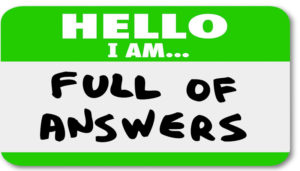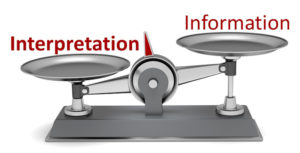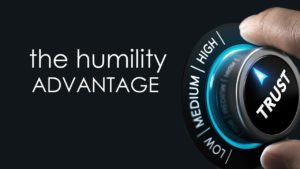Answer the client’s NEXT unspoken question
 “The best advice I ever received on earning customer respect was…” (This was a manager I interviewed in preparation for a customized virtual Trusted Advisor seminar I would be staging for her company). She said a mentor advised her to, “… always answer the client’s NEXT unspoken question.” In other words, when you share information with a customer, it often prompts more questions like, what are the costs… what are the alternatives… how does this address my other concerns and goals... etc. The key is not forcing the client to ask obvious follow up questions. Give that information up front. My take on why this approach is so impactful is it demonstrates you are thinking ahead of the customer. It proves you’re considering their larger desires, and it positions you as a strategic thinker, not just an order taker. So, next time you report to a customer or other stakeholder, be sure to also answer their next unspoken question.
“The best advice I ever received on earning customer respect was…” (This was a manager I interviewed in preparation for a customized virtual Trusted Advisor seminar I would be staging for her company). She said a mentor advised her to, “… always answer the client’s NEXT unspoken question.” In other words, when you share information with a customer, it often prompts more questions like, what are the costs… what are the alternatives… how does this address my other concerns and goals... etc. The key is not forcing the client to ask obvious follow up questions. Give that information up front. My take on why this approach is so impactful is it demonstrates you are thinking ahead of the customer. It proves you’re considering their larger desires, and it positions you as a strategic thinker, not just an order taker. So, next time you report to a customer or other stakeholder, be sure to also answer their next unspoken question.
Are you an Informer or Interpreter?
 I believe those who claim we are living in the information age are missing the point. Your customers have more information and choices than they know what to do with. That’s the problem. Too much information. What customers are craving for – and willing to pay a premium for – is analysis. They want your interpretation of all the available products/services/solutions available, and they want your advice about which are best suited to their unique needs. They don’t want you to send them to websites, offer to send them more information, or hand them instruction manuals. Information has become a cheap commodity. It’s your interpretation and advice that makes your services highly valued.
I believe those who claim we are living in the information age are missing the point. Your customers have more information and choices than they know what to do with. That’s the problem. Too much information. What customers are craving for – and willing to pay a premium for – is analysis. They want your interpretation of all the available products/services/solutions available, and they want your advice about which are best suited to their unique needs. They don’t want you to send them to websites, offer to send them more information, or hand them instruction manuals. Information has become a cheap commodity. It’s your interpretation and advice that makes your services highly valued.
Thank you for Calling…
 Quick – when phoning a company, which of these two organizations would you prefer doing business with? The first answers, “ABC Stereos.” The second answers, “Thank you for calling XYZ Stereos, this is Dale.” If you’re like most customers, the second company gets your business. They sound more professional and they sound like they have had training on answering the telephone. When employees are trained properly to answer the phone, there’s a good chance they’re also trained to solve your problems. Lesson: providing “telephone training” creates an easy competitive advantage over your competitors.
Quick – when phoning a company, which of these two organizations would you prefer doing business with? The first answers, “ABC Stereos.” The second answers, “Thank you for calling XYZ Stereos, this is Dale.” If you’re like most customers, the second company gets your business. They sound more professional and they sound like they have had training on answering the telephone. When employees are trained properly to answer the phone, there’s a good chance they’re also trained to solve your problems. Lesson: providing “telephone training” creates an easy competitive advantage over your competitors.
Eye on the Prize
 In a work-world that’s increasingly filled with interruptions and distractions, it’s easier for people to become more busy but less productive. The irony is that if you tend toward perfectionism you’re even more likely to be side-tracked. You know the routine: you’re focused on one task when the phone rings, someone walks-in, or an email arrives. so – in the interest of being responsive – you move to that. Then something else catches your eye. I’ve found in these situation when I’m spinning my wheels, it’s helpful to remind myself, “Eye on the Prize.” It’s a simple mantra to help you ignore the distractions, return to the task (the prize) and get it off your list. The bonus is at the end of the day you feel like you actually accomplished something.
In a work-world that’s increasingly filled with interruptions and distractions, it’s easier for people to become more busy but less productive. The irony is that if you tend toward perfectionism you’re even more likely to be side-tracked. You know the routine: you’re focused on one task when the phone rings, someone walks-in, or an email arrives. so – in the interest of being responsive – you move to that. Then something else catches your eye. I’ve found in these situation when I’m spinning my wheels, it’s helpful to remind myself, “Eye on the Prize.” It’s a simple mantra to help you ignore the distractions, return to the task (the prize) and get it off your list. The bonus is at the end of the day you feel like you actually accomplished something.
The Humility Advantage
 My ears perked up when I heard a politician who, during a radio interview, made a statement that included the phrasing, “I don’t profess to be knowledgeable in all areas of… What I DO know is…” I found myself thinking, Wow – he’s honest and smart. Ironic how admitting up front what you don’t know actually increases your credibility when you make a statement about what you do believe. The technique itself is easy. The challenge is being secure enough and humble enough to admit we don’t have all the answers.
My ears perked up when I heard a politician who, during a radio interview, made a statement that included the phrasing, “I don’t profess to be knowledgeable in all areas of… What I DO know is…” I found myself thinking, Wow – he’s honest and smart. Ironic how admitting up front what you don’t know actually increases your credibility when you make a statement about what you do believe. The technique itself is easy. The challenge is being secure enough and humble enough to admit we don’t have all the answers.
Creating Customer Buy-in
 Imagine that after studying your customer’s problem, you’ve come up with an innovative solution. The challenge is the more we think of our solution as being brilliant, the more likely we are to oversell it. Next time you have an idea, product, service that’s out of the ordinary, ask: What if…? For example, “What if we had a way to…? Then wait for the customer to verbalize the possibilities. Further ask: “What would be the value of that?” Again the other person continues to sell themselves. Asking what if shifts the ownership of the idea to the customer. When that happens, you’ve literally created buy-in.
Imagine that after studying your customer’s problem, you’ve come up with an innovative solution. The challenge is the more we think of our solution as being brilliant, the more likely we are to oversell it. Next time you have an idea, product, service that’s out of the ordinary, ask: What if…? For example, “What if we had a way to…? Then wait for the customer to verbalize the possibilities. Further ask: “What would be the value of that?” Again the other person continues to sell themselves. Asking what if shifts the ownership of the idea to the customer. When that happens, you’ve literally created buy-in.
Don’t be Better, be Different
Admit it – your customers can find a supplier somewhere in the world with cheaper prices than you. That means that trying to compete based on price is rarely a viable option. What likely differentiates you from others is not your prices, but your service. The logical question then becomes is your service really that different from others. Most managers think great service means their employees are nice. But your competitors know how to be nice too. What distinguishes service as being different is when you focus more on creating trust then merely trying to be nice. Who would you rather do business with – the friend who’s nice, but unreliable, or the professional who makes service commitments and then keeps them consistently? In this economy, nice is average, trust-worthy is different.
They Myth of Self Expression
 I asked my Mom and Dad, what their secret was to being happily married for over 60 years. They replied, “Knowing when to keep your thoughts to yourself.” Unfortunately, a lot of messages in today’s media are laced with sarcasm and put-downs, supposedly meant to be funny. We become so inured to this that we forget how hurtful these ‘witty’ quips can be to others. I’ve been through divorce myself (fortunately no kids at the time), and thankfully I’m now happily married with two daughters. Having been through the wars myself, I have to agree with my folks. Most often relationships – at home and at work – grow stronger when we resist the temptation to express every ‘innocent’ put-down, minor annoyance, and fleeting thought.
I asked my Mom and Dad, what their secret was to being happily married for over 60 years. They replied, “Knowing when to keep your thoughts to yourself.” Unfortunately, a lot of messages in today’s media are laced with sarcasm and put-downs, supposedly meant to be funny. We become so inured to this that we forget how hurtful these ‘witty’ quips can be to others. I’ve been through divorce myself (fortunately no kids at the time), and thankfully I’m now happily married with two daughters. Having been through the wars myself, I have to agree with my folks. Most often relationships – at home and at work – grow stronger when we resist the temptation to express every ‘innocent’ put-down, minor annoyance, and fleeting thought.
How Sharing Less creates more Trust
 If you’ve been reading my tips or attending my seminars over the years, you’ve likely heard me refer to the importance of being discreet about what you share with customers. Samples are at Six Oversharing Blunders and Keep this Between Us. Here’s the problem - one of our most persuasive tools when helping people to make buying decisions is referencing similar work you’ve done for other customers. Assuming you have your customer’s permission to use them as a reference, its fine to share general information, but rarely is it appropriate to share anything about their monetary affairs. So if you are pressed to reveal your client’s numbers, here’s a handy phrase, “For obvious reasons I don’t share my clients’ financials, just as I won’t share yours with anyone else. What I can tell you is…” It’s ironic how explaining why you’ll share less information actually creates more trust.
If you’ve been reading my tips or attending my seminars over the years, you’ve likely heard me refer to the importance of being discreet about what you share with customers. Samples are at Six Oversharing Blunders and Keep this Between Us. Here’s the problem - one of our most persuasive tools when helping people to make buying decisions is referencing similar work you’ve done for other customers. Assuming you have your customer’s permission to use them as a reference, its fine to share general information, but rarely is it appropriate to share anything about their monetary affairs. So if you are pressed to reveal your client’s numbers, here’s a handy phrase, “For obvious reasons I don’t share my clients’ financials, just as I won’t share yours with anyone else. What I can tell you is…” It’s ironic how explaining why you’ll share less information actually creates more trust.
Close the Loop and Gain a Raving Fan
 A manager in one of my seminars asked me to share an easy, low cost tip that would turn their existing customers (their office tower tenants) into raving fans. In response, I walked her and her property management team through these two scenarios; in both cases a tenant calls a property manager about a plumbing issue that has put their washroom out of service.
A manager in one of my seminars asked me to share an easy, low cost tip that would turn their existing customers (their office tower tenants) into raving fans. In response, I walked her and her property management team through these two scenarios; in both cases a tenant calls a property manager about a plumbing issue that has put their washroom out of service.
First case: The property manager books a plumber who then fixes the problem. End of story.
Second case: The property manager books a plumber. Plumber fixes problem and promptly texts property manager: repair completed. Property manager then phones the tenant advising her the washrooms are back in service. Tenant emails her coworkers: washrooms are back up and running.
Consider the difference in customer perception by merely reporting back when something is done. In the first case customers may be waiting all day; not realizing the washrooms are repaired. Second case, when the customer is informed when the works complete, they’re more likely to think, “Wow, that was fast. These folks are really on top of things!” Plus, the service provider has made the customer look like a hero to her colleagues. The service providers didn’t work harder or faster. They just reported back promptly. Takes seconds. Costs nothing. So, how are you and your team members when it comes to closing the customer communication loop?


